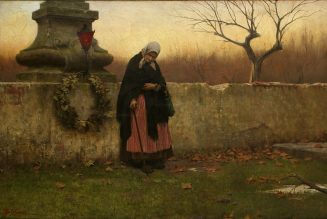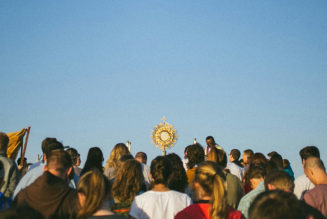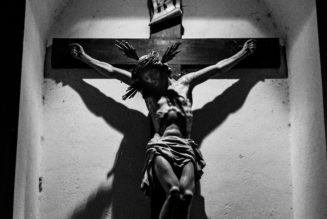By DONAL ANTHONY FOLEY
March is traditionally the month dedicated to St. Joseph, and his major feast day, a solemnity, falls on the 19th — but the outstanding Solemnity during this month, the Feast of the Annunciation, falls six days later, on March 25.
This feast day celebrates the extraordinary meeting between our Lady and the Angel Gabriel, as recounted in the first chapter of St. Luke’s Gospel. In a sense, “extraordinary” is too tame a word to describe this event since, quite literally, the fate of the entire human race rested on it. And this is why the Annunciation is one of the great feast days of the Church.
And although the feast is primarily associated in the minds of most Catholics with our Lady, it is also a great Feast of our Lord, since it celebrates His Incarnation, His becoming man in the womb of His Blessed Mother. And it is more than just an important feast; it is actually the feast upon which all other Catholic feasts and celebrations depend.
God sent the Angel Gabriel to Nazareth to announce to Mary His desire that she should become the mother of His Son, the Second Person of the Blessed Trinity. Gabriel first saluted her as one who was “full of grace,” and then told her not to be afraid because she had found favor with God. He then went on to tell her that she would conceive in her womb and bear a son, and she should call His name Jesus, a name which means “Savior.”
The angel completed his announcement by saying, “He will be great, and will be called the Son of the Most High; and the Lord God will give to him the throne of his father David, and he will reign over the house of Jacob for ever; and of his Kingdom there will be no end.”
We can see here that this message from the Angel was a truly momentous one, announcing the salvation of mankind and the greatness of the God-man and his everlasting Kingdom.
But none of this would happen without Mary’s consent, the consent of a young girl from a poor backward village in Galilee. And this consent was very much dependent on her free choice. She could have refused to become the Mother of God — but with dire consequences for humanity.
But such was her holiness and willingness to do God’s will, regardless of what difficulties it might entail, that, after a pause and a question to, in effect, seek reassurance that she would not have to break the vow of virginity that Catholic tradition asserts that she had made, she replied, “Behold, I am the handmaid of the Lord; let it be to me according to your word.”
At that moment, Jesus became incarnate in her womb, and the salvation of humanity — or that portion of humanity which sought salvation — was assured.
The remarkable thing is that we can see from this dialogue that God built the whole plan of redemption on her decision, knowing that He could depend on her. In that sense, the issue was never in doubt, and in fact the promise of redemption had been made in the Garden of Eden to Adam and Eve after they fell into original sin. But still, our Lady had to freely make the decision she did make, and that required tremendous faith and humility.
We can also think about the depths of humility which our Lord plumbed in becoming man, going from the infinite perfection of Heaven to live in the midst of a sinful humanity.
He did this in obedience to the will of His Heavenly Father, and we can also see our Lady’s response to Gabriel as an act of profound obedience. In doing this she was, as a number of the Church Fathers assert, atoning for the disobedience of Eve, the disobedience which precipitated humanity into the depths of sin. They contrast the way the Blessed Virgin accepted the announcement of the good angel, Gabriel, with the way that Eve succumbed to the temptation of the evil angel, Satan.
But while the Feast of the Annunciation, or Incarnation of our Lord, is the spiritual high point of March, we must not forget St. Joseph, the other member of the Holy Family, during this month dedicated to him.
We can honor him at this time through prayer and through novenas, and in particular, we can remember him and pray to him on the day of the week dedicated to him, Wednesday, just as we keep Saturdays in honor of our Lady and particularly remember Christ every Friday.
An additional devotion we can practice toward St. Joseph is to commemorate the first Wednesday of each month, as part of the Nine First Wednesdays devotion to the saint. This devotion sees St. Joseph as the patron of a happy death, and is based on the traditional belief that he had the happiest possible death, that is, in the presence of Jesus and Mary.
To practice this devotion, we should aim to attend Mass and receive Holy Communion on each of the first Wednesdays of the month for nine months. This needs to be done with the intention of both honoring St. Joseph and also praying for the salvation of the dying, and in addition, we can ask for a happy death for ourselves and for our family members.
Pope Pius IX greatly enhanced St. Joseph’s position in the Church in 1870, when he declared him to be the Patron and Guardian of the Universal Church, a recognition of the spiritual paternity he exercises over the faithful, the Body of Christ, similar to the one he exercised over Jesus.
During the 1930s, Pope Pius XI promulgated an encyclical on atheistic Communism entitled Divini Redemptoris, which was actually issued on the Feast of St. Joseph, the 19th of March, 1937. In this he said:
“To hasten the advent of that ‘peace of Christ in the Kingdom of Christ’ so ardently desired by all, We place the vast campaign of the Church against world Communism under the standard of St. Joseph, her mighty Protector.”
This patronage is still very relevant for the Church, as the recent events in Ukraine, and the resurgence of Communist-type violence, shows. We also have other Communist-type regimes, such as China, which are also a profound threat to peace in the world. But apart from that, there is the disturbing phenomenon of Cultural Marxism which is currently laying waste the moral order in the West. As our Lady warned at Fatima, Russia has indeed spread its errors throughout the world.
We were reminded of the importance of St. Joseph recently, when, to mark the 150th anniversary of the 1870 declaration of Pius IX, Pope Francis declared a year dedicated to the saint, which ended on December 8, 2021.
Thus as Communist-influenced regimes and thinking continue to plague the Church and the world, we need to invoke St. Joseph as our mighty protector against all such evils, and pray for his powerful intercession and guidance. And at the same time, we must not forget our Lady’s great promise at Fatima, that, in the end her Immaculate Heart will triumph and a period of peace will be given to the world.
(Donal Anthony Foley is the author of a number of books on Marian apparitions, and maintains a related website at www.theotokos.org.uk. His updated book on this topic, Medjugorje Complete, was published by Angelico Press. He has also written two time-travel/adventure books for young people, and the third in the series is due to be published later this year — details can be seen at: http://glaston-chronicles.co.uk.)
Join Our Telegram Group : Salvation & Prosperity









